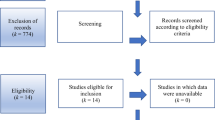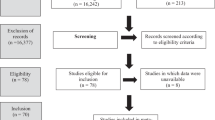Abstract
Despite decades of increased research and funding, youth mentoring programs, overall, yield small effects on youth outcomes. As a result, there are growing calls for programs to utilize the mentoring relationship as context for intentional, targeted skills development, in which mentors employ targeted skills designed to match the presenting concerns of mentees. This targeted approach contrasts with the historically dominant, non-specific friendship model, which holds that a supportive relational bond—alone—promotes positive developmental change. The current study is a follow-up meta-analysis using a comprehensive dataset of all intergenerational, one-on-one mentoring program evaluations published between 1975 and 2018, investigating the comparative impact of targeted, skills-based versus non-specific, relational approaches to mentoring. Analyses of 48 mentoring studies of youth outcomes (average youth age of 12.25 years old) revealed the overall effect size of targeted programs to be more than double that of non-specific relational approaches, with significant moderator effects on academic, psychological, and social functioning. Findings suggest that youth mentoring programs can promote positive outcomes, particularly when mentors employ targeted approaches matched to the needs of their mentees.

Similar content being viewed by others
References
Assink, M., & Wibbelink, C. M. (2016). Fitting three-level meta-analytic models in R: a step-by-step tutorial. The Quantitative Methods for Psychology, 12, 154–174. https://doi.org/10.20982/tqmp.12.3.p154.
Bernstein, L., Rappaport, C. D., Olsho, L., Hunt, D., & Levin, M. (2009). Impact evaluation of the US Department of Education’s Student Mentoring Program. Final Report. NCEE 2009-4047. National Center for Education Evaluation and Regional Assistance.
Bodin, M., & Leifman, H. (2011). A randomized effectiveness trial of an adult-to-youth mentoring program in Sweden. Addiction Research & Theory, 19(5), 438–447.
Cavell, T. A., & Elledge, L. C. (2015). Mentoring and prevention science. In M. J. Karcher & D. L. DuBois (Eds.), Handbook of youth mentoring (2nd edn., pp. 29–43). Thousand Oaks, CA: Sage. https://doi.org/10.4135/9781412996907.n3.
Cheung, M. W. L. (2014). Modeling dependent effect sizes with three-level meta-analyses: a structural equation modeling approach. Psychological Methods, 19, 211–229.
Cohen, J. (1960). A coefficient of agreement for nominal scales. Educational and Psychological Measurement, 20(1), 37–46. https://doi.org/10.1177/001316446002000104.
Cohen, J. (1988). Statistical power analysis for the behavioral sciences. 2nd edn., Hillsdale: Erlbaum.
Cook, B. L., Barry, C. L., & Busch, S. H. (2013). Racial/ethnic disparity trends in children’s mental health care access and expenditures from 2002 to 2007. Health Services Research, 48(1), 129–149. https://doi.org/10.1111/j.1475-6773.2012.01439.x.
DeSocio, J., VanCura, M., Nelson, L. A., Hewitt, G., Kitzman, H., & Cole, R. (2007). Engaging truant adolescents: results from a multifaceted intervention pilot. Preventing School Failure: Alternative Education for Children and Youth, 51(3), 3–9.
DuBois, D. L., Holloway, B. E., Valentine, J. C., & Cooper, H. (2002). Effectiveness of mentoring programs for youth: a meta-analytic review. American Journal of Community Psychology, 30(2), 157–197. https://doi.org/10.1023/A:1014628810714.
DuBois, D. L., Portillo, N., Rhodes, J. E., Silverthorn, N., & Valentine, J. C. (2011). How effective are mentoring programs for youth? A systematic assessment of the evidence. Psychological Science in the Public Interest, 12(2), 57–91. https://doi.org/10.1177/1529100611414806.
Fernandes‐Alcantara, A. L. (2018). Vulnerable youth: federal mentoring programs and issues. Washington, D.C: Congressional Research Services.
Garringer, M., Kupersmidt, J. B., Rhodes, J. E., Stelter, R. L., & Tai, T. (2015). Elements of effective practices for mentoring. Boston, MA: MENTOR: The National Mentoring Partnership.
Garringer, M., McQuillin, S., & McDaniel, H. (2017). Examining youth mentoring services across America: findings from the 2016 National Mentoring Program survey. Boston, MA: MENTOR: The National Mentoring Partnership.
Grossman, J. B., Chan, C. S., Schwartz, S. E. O., & Rhodes, J. E. (2012). The test of time in school-based mentoring: the role of relationship duration and re-matching on academic outcomes. American Journal of Community Psychology, 49(1–2), 43–54. https://doi.org/10.1007/s10464-011-9435-0.
Heckman, J. J., & Kautz, T. (2013). Fostering and measuring skills: interventions that improve character and cognition (No. w19656). National Bureau of Economic Research.
Hedges, L., & Olkin, I. (1985). Statistical models for meta-analysis. New York: Academic Press.
Herrera, C., Grossman, J. B., Kauh, T. J., & McMaken, J. (2011). Mentoring in schools: an impact study of Big Brothers Big Sisters school-based mentoring. Child Development, 82(1), 346–361. https://doi.org/10.1111/j.1467-8624.2010.01559.x.
Holt, L. J., Bry, B. H., & Johnson, V. L. (2008). Enhancing school engagement in at-risk, urban minority adolescents through a school-based, adult mentoring intervention. Child & Family Behavior Therapy, 30(4), 297–318.
Jarjoura, G. R., Tanyu, M., Forbush, J., Herrera, C., & Keller, T. E. (2018). Evaluation of the mentoring enhancement demonstration program: Technical report. Washington, D.C.: American Institute for Research.
Jent, J. F., & Niec, L. N. (2006). Mentoring youth with psychiatric disorders: the impact on child and parent functioning. Child & Family Behavior Therapy, 28(3), 43–58.
Johnson, A. W. (1997). Mentoring at-risk youth: a research review and evaluation of the impacts of the Sponsor-A-Scholar program on student performance. Dissertations available from ProQuest. AAI9727243. https://repository.upenn.edu/dissertations/AAI9727243.
Karcher, M. J., Davis, C., & Powell, B. (2002). The effects of developmental mentoring on connectedness and academic achievement. The School Community Journal, 12(2), 35–50.
Karver, M. S., De Nadai, A. S., Monahan, M., & Shirk, S. R. (2018). Meta-analysis of the prospective relation between alliance and outcome in child and adolescent psychotherapy. Psychotherapy, 55(4), 341 https://doi.org/10.1037/pst0000176.
Karver, M. S., Handelsman, J. B., Fields, S., & Bickman, L. (2006). Meta-analysis of therapeutic relationship variables in youth and family therapy: the evidence for different relationship variables in the child and adolescent treatment outcome literature. Clinical Psychology Review, 26(1), 50–65. https://doi.org/10.1016/j.cpr.2005.09.001.
King, K. A., Vidourek, R. A., Davis, B., & McClellan, W. (2002). Increasing self‐esteem and school connectedness through a multidimensional mentoring program. Journal of School Health, 72(7), 294–299.
Knapp, G., & Hartung, J. (2003). Improved tests for a random effects meta‐regression with a single covariate. Statistics in Medicine, 22(17), 2693–2710.
Kraemer, H. C., & Kupfer, D. J. (2006). Size of treatment effects and their importance to clinical research and practice. Biological Psychiatry, 59(11), 990–996.
Kupersmidt, J. B., Stump, K. N., Stelter, R. L., & Rhodes, J. E. (2017). Predictors of premature match closure in youth mentoring relationships. American Journal of Community Psychology, 59(1–2), 25–35. https://doi.org/10.1002/ajcp.12124.
Li, J., & Julian, M. M. (2012). Developmental relationships as the active ingredient: a unifying working hypothesis of “what works” across intervention settings. American Journal of Orthopsychiatry, 82(2), 157–166. https://doi.org/10.1111/j.1939-0025.2012.01151.x.
Lyons, M. D., McQuillin, S. D., & Henderson, L. J. (2019). Finding the sweet spot: investigating the effects of relationship closeness and instrumental activities in school‐based mentoring. American Journal of Community Psychology, 63(1–2), 88–98.
McHugh, M. L. (2012). Interrater reliability: the kappa statistic. Biochemia Medica, 22(3), 276–282.
McQuillin, S. D., & Lyons, M. D. (2016). Brief instrumental school-based mentoring for middle school students: theory and impact. Advances in School Mental Health Promotion, 9(2), 73–89. https://doi.org/10.1080/1754730x.2016.1148620.
Mohr, D., Cuijpers, P., & Lehman, K. (2011). Supportive accountability: a model for providing human support to enhance adherence to eHealth interventions. Journal of Medical Internet Research, 13(1), e30.
Raposa, E. B., Rhodes, J. E., & Herrera, C. (2016). The impact of youth risk on mentoring relationship quality: do mentor characteristics matter? American Journal of Community Psychology, 57, 320–329. https://doi.org/10.1002/ajcp.12057.
Raposa, E. B., Rhodes, J. E., Stams, G. J. J. M., Card, N., Burton, S., Schwartz, S. E. O., … Hussain, S. B. (2019). The effects of youth mentoring programs: a meta-analysis of outcome studies. Journal of Youth and Adolescence. https://doi.org/10.1007/s10964-019-00982-8.
Rhodes, J. E. (2005). A theoretical model of youth mentoring. In D. L. DuBois & M. J. Karcher (Eds.), Handbook of youth mentoring (pp. 30–43). Thousand Oakes: Sage Press.
Rose, T. (2016). The end of average: how we succeed in a world that values sameness. New York, NY: Harper One.
Simões, F., & Alarcão, M. (2014). Promoting well-being in school-based mentoring through basic psychological needs support: does it really count? Journal of Happiness Studies, 15(2), 407–424.
Spencer, R. (2007). “It’s not what I expected”: a qualitative study of youth mentoring relationship failures. Journal of Adolescent Research, 22(4), 331–354.
Sowers, J. A., Powers, L., Schmidt, J., Keller, T. E., Turner, A., Salazar, A., & Swank, P. R. (2017). A randomized trial of a science, technology, engineering, and mathematics mentoring program. Career Development and Transition for Exceptional Individuals, 40(4), 196–204.
Tabachnik, B. G., & Fidell, L. S. (2013). Using multivariate statistics. 6th edn. Boston: Allyn and Bacon.
Tanner-Smith, E. E., Durlak, J. A., & Marx, R. A. (2018). Empirically based mean effect size distributions for universal prevention programs targeting school-aged youth: a review of meta-analyses. Prevention Science, 19(8), 1091–1101. https://doi.org/10.1007/s11121-018-0942-1.
Vázquez, A. L., & Villodas, M. T. (2018). Racial/ethnic differences in caregivers’ perceptions of the need for and utilization of adolescent psychological counseling and support services. Cultural Diversity and Ethnic Minority Psychology. https://doi.org/10.1037/cdp0000255.
Van den Noortgate, W., López-López, J. A., Marín-Martínez, F., & Sánchez-Meca, J. (2014). Meta-analysis of multiple outcomes: a multilevel approach. Behavior Research Methods, 47, 1274–1294. https://doi.org/10.3758/s13428-014-0527-2.
Weiler, L. M., Chesmore, A. A., Pryce, J., Haddock, S. A., & Rhodes, T. (2017). Mentor response to youth academic support–seeking behavior: does attunement matter? Youth & Society, 1–22. https://doi.org/10.1177/0044118×17697235.
Weisz, J. R., Kuppens, S., Eckshtain, D., Ugueto, A. M., Hawley, K. M., & Jensen-Doss, A. (2013). Performance of evidence-based youth psychotherapies compared with usual clinical care: a multilevel meta-analysis. JAMA Psychiatry, 70(7), 750–761.
Weisz, J. R., Kuppens, S., Ng, M. Y., Eckshtain, D., Ugueto, A. M., Vaughn-Coaxum, R., & Weersing, V. R. (2017). What five decades of research tells us about the effects of youth psychological therapy: a multilevel meta-analysis and implications for science and practice. American Psychologist, 72(2), 79.
Weisz, J. R., Sandler, I. N., Durlak, J. A., & Anton, B. S. (2005). Promoting and protecting youth mental health through evidence-based prevention and treatment. American Psychologist, 60(6), 628.
Authors’ Contributions
K.M.C. assisted in the development of coding schemes, co-led data management and coding of relevant studies, wrote the first draft of the manuscript, and coordinated draft revisions; M.A.H. conducted literature searches, identified relevant studies, and contributed to drafts of the manuscript; G.J.J.M.S. consulted on study coding, conducted the statistical analyses, and contributed to drafts of the manuscript; E.B.R. co-led data management, assisted in the development of coding schemes, and contributed to drafts of the manuscript; S.B. assisted in the development of coding schemes and coding of relevant studies; J.E.R. conceptualized the study, oversaw study execution, and contributed to drafts of the manuscript. All authors read and approved the final manuscript.
Funding
The authors gratefully acknowledge the support of the MacArthur Foundation Research Network on Connected Learning and MENTOR: The National Mentoring Partnership. The first and second authors would each like to acknowledge support from the National Science Foundation’s Graduate Research Fellowship Program.
Data Sharing and Declaration
The datasets generated and/or analyzed during the current study are not publicly available but are available from the corresponding author on reasonable request.
Author information
Authors and Affiliations
Corresponding author
Ethics declarations
Conflict of Interest
The authors declare that they have no conflict of interest.
Ethical Approval
All was conducted in compliance with APA ethical principles. The study consisted of secondary analyses of de-identified data, and therefore did not require formal consent or approval by the University of Massachusetts Boston Institutional Review Board.
Additional information
Publisher’s note Springer Nature remains neutral with regard to jurisdictional claims in published maps and institutional affiliations.
Rights and permissions
About this article
Cite this article
Christensen, K.M., Hagler, M.A., Stams, GJ. et al. Non-Specific versus Targeted Approaches to Youth Mentoring: A Follow-up Meta-analysis. J Youth Adolescence 49, 959–972 (2020). https://doi.org/10.1007/s10964-020-01233-x
Received:
Accepted:
Published:
Issue Date:
DOI: https://doi.org/10.1007/s10964-020-01233-x




